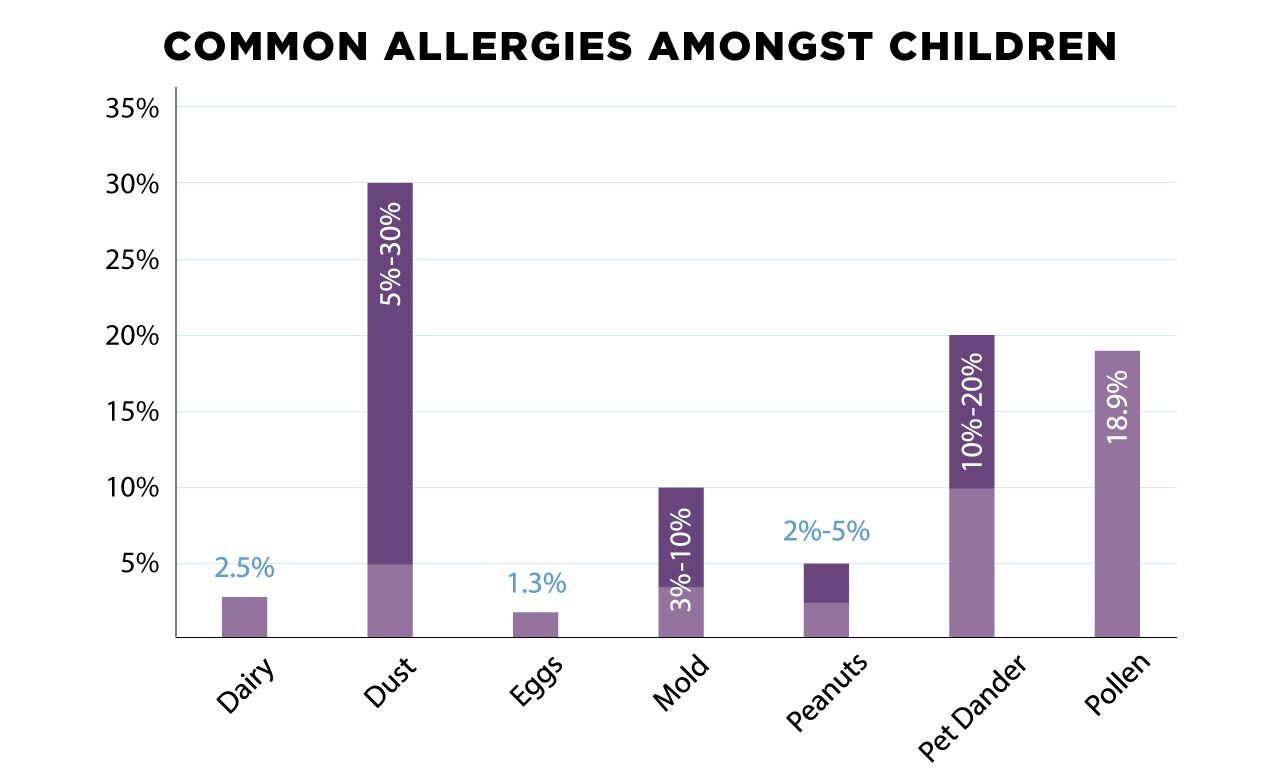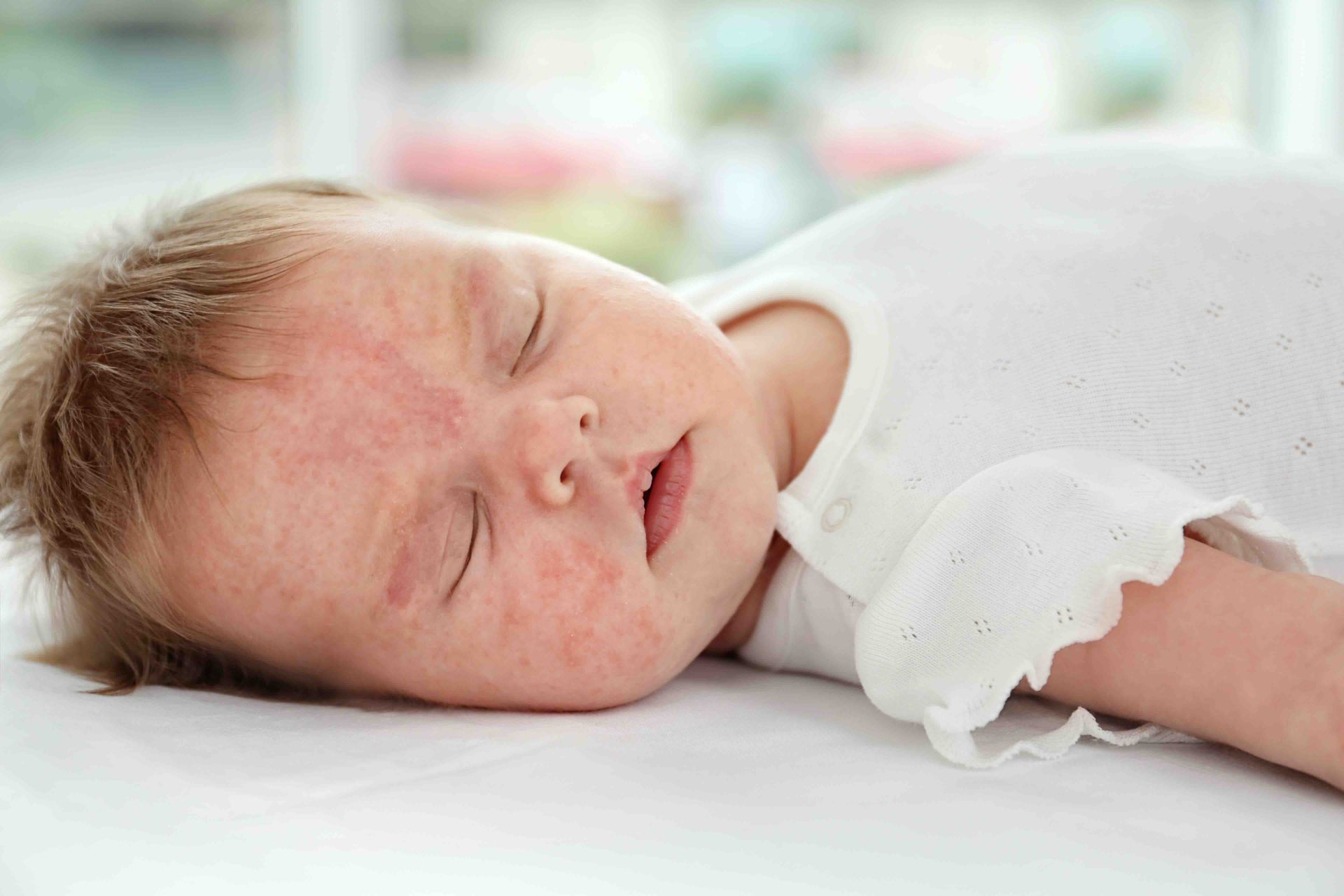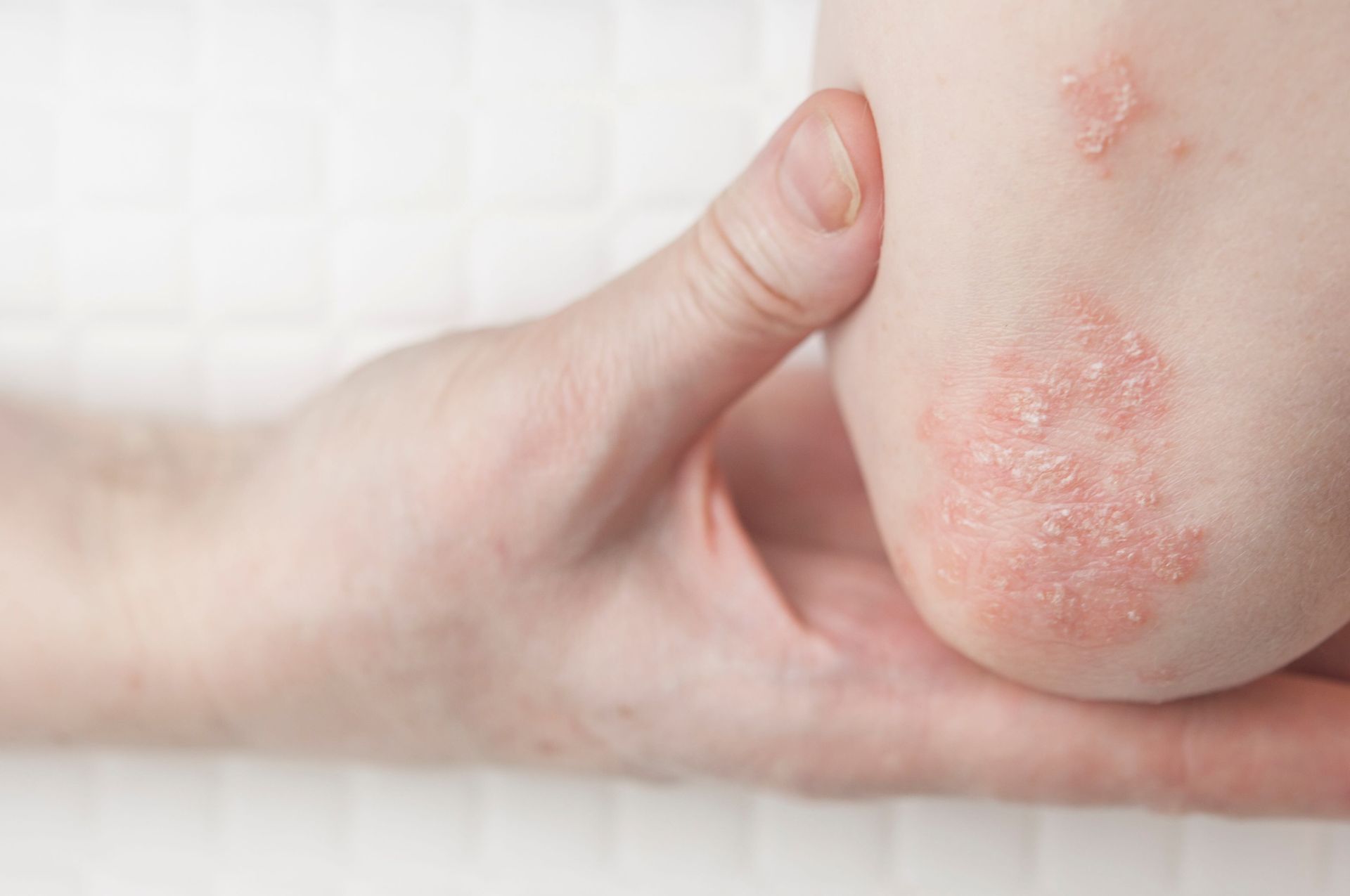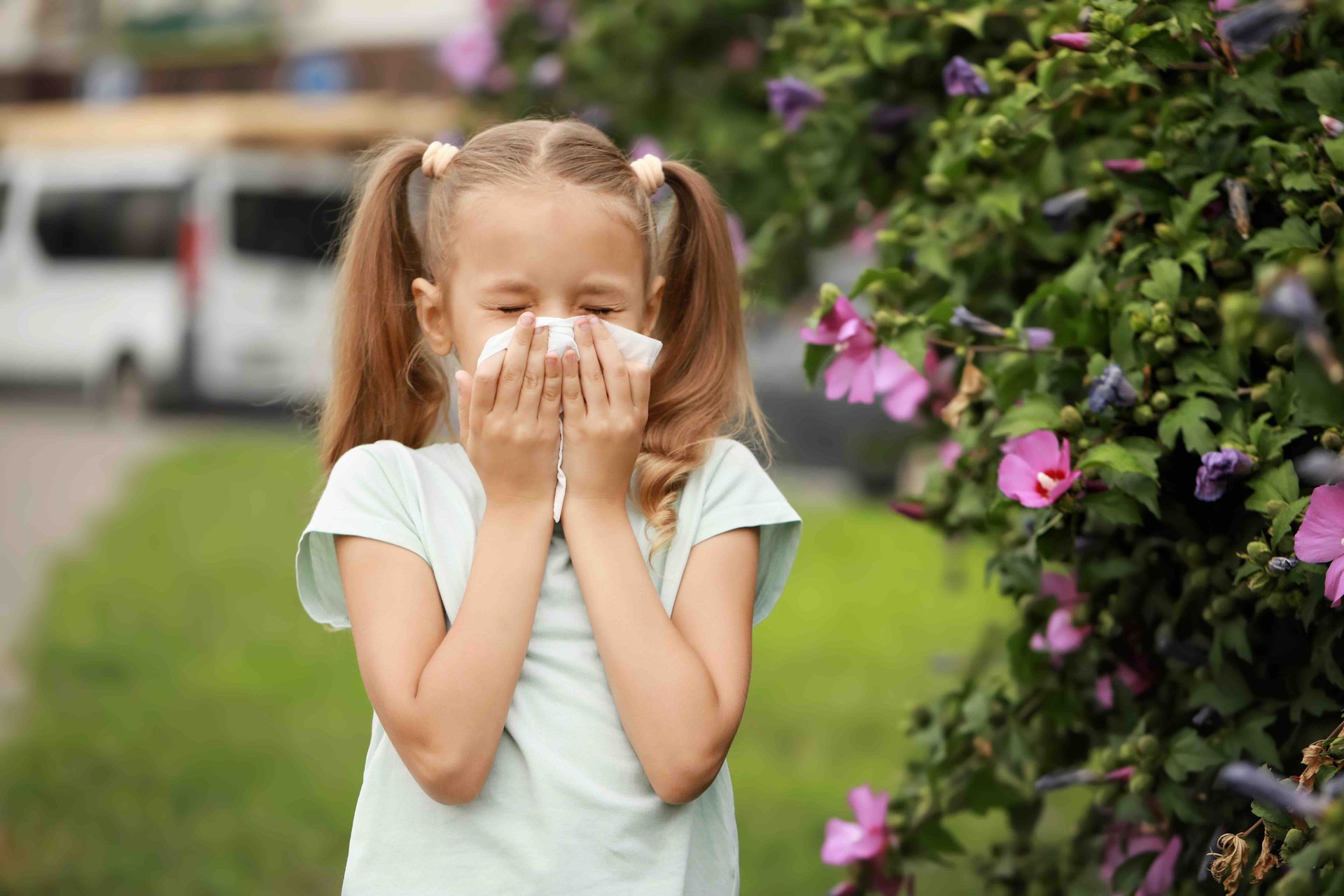8 Tips for Managing Allergies in Infants and Young Children
At Family Medical Center, we understand how challenging it can be to manage allergies in infants and young children.
Allergies are common in babies and toddlers. According to the
Asthma and Allergy Foundation of America, nearly 1 in 4 U.S. children develop allergies such as a seasonal allergy, eczema, or food allergies. These can be complicated and difficult for parents to manage, especially during infancy.
However, early identification and management can help minimize discomfort and prevent severe allergic reactions. When you understand your child’s allergy symptoms, triggers, and best practices for prevention, you can help your little one
grow up healthy!
If your child has an allergy, here are some of the top tips from Dr. Barnett’s team for learning about and managing allergies in children.
1. Know the Common Allergy Symptoms & Triggers in Children
As a parent, you’re probably wondering, “How do I even know if my child has an allergy?”
To answer this question, you’ll need to monitor your child carefully, especially when they encounter common allergy triggers. These can include things like:
- Dairy
- Dust
- Eggs
- Mold
- Peanuts
- Pet Dander
- Pollen

Sources:
- https://www.foodallergy.org/living-food-allergy/food-allergy-essentials/common-allergens/milk
- https://kidswithfoodallergies.org/living-with-food-allergies/top-food-allergens/egg-allergy/
- https://pmc.ncbi.nlm.nih.gov/articles/PMC4149917/
- https://www.cdc.gov/nchs/products/databriefs/db459.htm
- https://aafa.org/allergies/types-of-allergies/pet-dog-cat-allergies/
- https://www.thermofisher.com/allergy/us/en/allergen-fact-sheets/mold.html
Allergy symptoms to any of these triggers (and others) can sometimes be confused with colds or infections, especially when your child has a stuffy or runny nose. Therefore, it can be hard to spot the signs of an allergic reaction versus an illness.
Typical allergy and asthma symptoms may include skin rashes, nasal congestion, digestive issues, sneezing, coughing, watery eyes, or breathing difficulties.
If you believe your child may be at risk for a certain allergy, you may want to be careful about how you introduce them to the source.
For instance, many parents are concerned about peanut allergies in infants and toddlers. As such, many caregivers are hyper-aware of their children’s reactions to peanut products, especially
between infancy and 5 years of age.
You may not immediately recognize your child’s triggers, but try to take note of cold-like or hay fever symptoms that come on suddenly or seem to be tied to certain sources. These could be allergic reactions that require attention.

2. Identifying Allergic Reactions to Certain Foods Early
Food allergies are one of the most common types of allergies in young children. According to
Johns Hopkins Medicine, almost 90% of food allergies are caused by nine specific allergens:
- Milk
- Eggs
- Wheat
- Soybeans
- Tree nuts
- Peanuts
- Fish
- Shellfish
- Sesame
When introducing new foods (especially those that contain the potential triggers listed above), it’s best to do so one at a time and watch for any allergic reactions such as hives, vomiting, or difficulty breathing.
If your child already has a food allergy, you’ll need to stay on top of allergy-friendly diet management. Your pediatrician or allergist can help your family create a safe and nutritious meal plan.
3. Managing Seasonal Allergies in Young Children
The CDC estimates that nearly 1 in 5 children have a seasonal allergy. These can be triggered by pollen, mold, and dust mites, and they can cause discomfort in young children. Seasonal allergies often result in sneezing, itchy eyes, and congestion.
While these environmental allergies can’t necessarily be cured, there are steps parents can take to alleviate symptoms:
- Keep windows closed during high pollen seasons.
- Use air purifiers to improve indoor air quality.
- Wash bedding and stuffed toys frequently to minimize dust mites.
- Keep pets clean to reduce dander in the home.
These tips are especially helpful during the fall and spring months when seasonal allergies are more likely to pop up due to weather changes.
4. Removing Allergy Triggers From the Home
A clean home environment can make a significant difference in reducing allergy symptoms. Minimizing dust, mold, and pet dander can help prevent allergic reactions and improve air quality.
Here are some tips for supporting an allergen-free space:
- Use HEPA filters in your HVAC system and vacuum.
- Regularly clean floors, curtains, and furniture to remove dust and allergens.
- Choose hypoallergenic bedding and avoid strong perfumes and scented products.
If you do implement an air filter or allergy-prevention device, it’s best to make sure it is
Certified Asthma and Allergy Friendly®.

5. Understanding Skin Allergic Reactions & Eczema in Babies
Skin allergies such as eczema, hives, and contact dermatitis are especially common in infants and young children. In fact, the National Eczema Association states that these concerns often appear within the first six months to five years of a child’s life.
These conditions can cause itching, redness, and discomfort. To reduce flare-ups if your child is allergic, we suggest:
- Avoiding harsh soaps, synthetic fabrics, and scented detergents.
- Keeping skin moisturized with hypoallergenic creams.
- Using prescribed treatments as recommended by a healthcare provider.
Pay close attention to your child’s triggers and irritants. This is usually the best way to protect their skin and help prevent recurring flare-ups.
6. Building a Strong Immune System
A well-functioning immune system can help reduce allergy severity at any age, including during childhood. That’s why it’s so important to boost your child’s immunity and keep them protected year-round.
If you’re looking to support your child’s immune system, you can start by:
- Providing a well-balanced diet rich in antioxidants and vitamins.
- Encouraging regular physical activity and quality sleep.
- Incorporating probiotics to support gut health.
These tips are especially important during cold and flu season, but they matter every month. The stronger your child’s immune system, the better they can fight off both illness and allergies.
7. Safe Allergy Medicines & Treatment Options
Over-the-counter antihistamines, nasal sprays, steroids, and allergy-friendly creams may be helpful in managing your child’s allergies. If you aren’t sure which products to use, discuss the options with your little one’s pediatrician or allergist.
For infants and toddlers, non-medicated treatments such as saline nasal rinses and cool-mist humidifiers can also help alleviate mild allergy symptoms like a runny nose. However, if your child is not responding to allergy medicines or these treatments, you’ll certainly want to seek further care.
In more severe cases, prescription medications or allergy shots may be necessary. Of course, you should also confirm that such measures are needed through allergy testing and professional medical guidance. Be sure to share all of your child’s symptoms with their healthcare provider.
8. Partnering with Your Child’s Healthcare Provider
Our last tip is to work closely with your child’s pediatrician or allergist at all stages. This is essential for effective allergy management, no matter your little one’s age, symptoms, or allergy triggers.
At
Family Medical Center, our healthcare providers can assist in diagnosing and treating childhood allergies. Professional allergy testing, such as skin or blood tests, can provide valuable insights into specific allergic reactions and guide personalized treatment plans, from nasal sprays to more advanced options.
Regular check-ups help confirm that allergy management strategies remain effective as children grow and their needs change. We can also offer guidance on emergency preparedness for severe allergic reactions, helping you feel confident and ready.

Turn to FMC for Help Managing Allergies in Children
Early recognition of allergies and proactive management can make a significant difference in a child’s well-being. By understanding triggers, creating an allergy-friendly home, and working with healthcare professionals, parents can help their children enjoy safe and active childhoods.
Don’t just assume it’s always hay fever (allergic rhinitis) or a simple runny nose: it’s always better to learn more about your child’s sensitivities and get allergies diagnosed early.
For experienced guidance on allergy medications, allergy shots, and personalized care in Lake Odessa,
schedule a consultation at Family Medical Center. Whether you’re dealing with seasonal allergy symptoms or something more specific, we’re here to help you find the path forward.

Your Family’s Health Is Our Priority
Your wellness matters to us. Take the next step in your care today.
1020 4th Ave
Lake Odessa, MI 48849
oFFICE HOURS
- Mon - Tue
- -
- Wed - Thu
- -
- Fri - Sun
- Closed
AFTER HOURS EMERGENCY CONTACT
1020 4th Ave
Lake Odessa, MI 48849
oFFICE HOURS
- Mon - Tue
- -
- Wed - Thu
- -
- Fri - Sun
- Closed
AFTER HOURS EMERGENCY CONTACT
All Rights Reserved
FAMILY MEDICAL CENTER
website designed by SPECK DESIGNS
All Rights Reserved | FAMILY MEDICAL CENTER
website designed by SPECK DESIGNS





